This April, the UVA Library honors National Arab American Heritage Month with selections of books and films by Arab American women. Leigh Rockey, Librarian for Collections Management and Video Resources, recommends the following titles.
Books
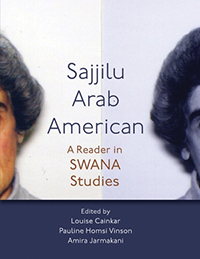 “Sajjilu Arab American: A Reader in SWANA Studies,” edited by Louise Cainkar, Pauline Homsi Vinson, and Amira Jarmakani, published by Syracuse University Press (2022), offers curated, contextualized essays outlining the history and possible futures of scholarship regarding Arab peoples in the Americas. There is no definition of what Arab American studies and/or Southwest Asian/North African studies mean, and this collection of works, both foundational and speculative, wants to stretch beyond such questions. The (R)eader moves through six approaches to the examination of Arab American bodies, arts, literatures, representations, movements, and more. We learn about interpretations of Arab-ness, the structures of race generating from and imposed on Arab American communities, intersections of belonging or exclusion, and ultimately, solidarities. Anyone looking to newly engage or reconstitute an understanding of Arab American studies would benefit from the many perspectives in this excellent primer.
“Sajjilu Arab American: A Reader in SWANA Studies,” edited by Louise Cainkar, Pauline Homsi Vinson, and Amira Jarmakani, published by Syracuse University Press (2022), offers curated, contextualized essays outlining the history and possible futures of scholarship regarding Arab peoples in the Americas. There is no definition of what Arab American studies and/or Southwest Asian/North African studies mean, and this collection of works, both foundational and speculative, wants to stretch beyond such questions. The (R)eader moves through six approaches to the examination of Arab American bodies, arts, literatures, representations, movements, and more. We learn about interpretations of Arab-ness, the structures of race generating from and imposed on Arab American communities, intersections of belonging or exclusion, and ultimately, solidarities. Anyone looking to newly engage or reconstitute an understanding of Arab American studies would benefit from the many perspectives in this excellent primer.
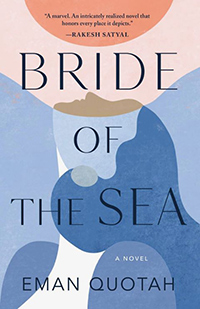 The following two works of fiction won the Arab American Book Award, given by the Arab American National Museum in Michigan in 2022 and 2023, respectively.
The following two works of fiction won the Arab American Book Award, given by the Arab American National Museum in Michigan in 2022 and 2023, respectively.
If a mother takes her daughter and keeps her away from the rest of her family for years, does the daughter have two lives — the one she knows in America and the one she is missing in Saudi Arabia? This question, or something like it, forms the center of Eman Quotah’s “Bride of the Sea.” Family drama is universal, but it's the specificity of the clash between Hannah/Hanadi's American and Saudi Arabian families that so deeply intrigues the reader of this book. Throughout, emotions peak when Hannah/Hanadi's own voice breaks through the narrative as she remembers that her mother “stole” her, how they hid behind curtains and fake names, and what happened when she in turn took herself away from her mother. What is the true course of her life, and will she ever find it? As her father says, God willing, you will be with the ones you love.
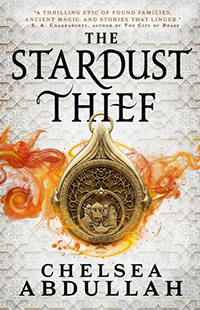 “The Stardust Thief” by Chelsea Abdullah, the first book of a forthcoming trilogy, offers tales within tales for lovers of storytelling. The reader follows the Midnight Merchant and her companions through enchanted cities and seas of sand to locate a certain lamp containing a powerful jinn. If you think you've heard this before (a la One Thousand and One Nights), you'd be wrong. While the book draws on familiar Arabian folktales, its story is fresh and quickly paced. Twisted truths, both delightful and harrowing, impact the literal and mystical routes the characters follow. Everyone is not what they seem, and the author crafts the cloaked identities so well that the reader might want to consume the book in one sitting.
“The Stardust Thief” by Chelsea Abdullah, the first book of a forthcoming trilogy, offers tales within tales for lovers of storytelling. The reader follows the Midnight Merchant and her companions through enchanted cities and seas of sand to locate a certain lamp containing a powerful jinn. If you think you've heard this before (a la One Thousand and One Nights), you'd be wrong. While the book draws on familiar Arabian folktales, its story is fresh and quickly paced. Twisted truths, both delightful and harrowing, impact the literal and mystical routes the characters follow. Everyone is not what they seem, and the author crafts the cloaked identities so well that the reader might want to consume the book in one sitting.
Films
“Jaddoland,” 2020
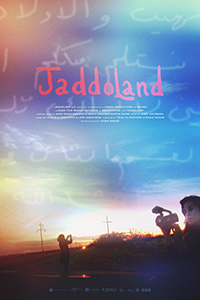 Filmmaker Nadia Shihab's mother Lahib is Iraqi, lives in Lubbock, Texas, and she is an artist. These ingredients are all that's needed to make a fascinating documentary of a life communicated through art. What is often absent from the frame becomes the center of the film’s intentions. We see just the waving tale of a black cat, and we know that the cat is intrigued by something. We hear Shihab's grandfather respond to the question of whether he likes Texas with, "It is Texas," and we know that he longs for Iraq. Looking at the camera, Lahib tries to explain a painting while she works on it, but she eventually lets the art speak for itself, much as the film refrains from imposing meaning on every scene. At the end, we are surprised at Lahib's choices, and the portrait becomes obscured.
Filmmaker Nadia Shihab's mother Lahib is Iraqi, lives in Lubbock, Texas, and she is an artist. These ingredients are all that's needed to make a fascinating documentary of a life communicated through art. What is often absent from the frame becomes the center of the film’s intentions. We see just the waving tale of a black cat, and we know that the cat is intrigued by something. We hear Shihab's grandfather respond to the question of whether he likes Texas with, "It is Texas," and we know that he longs for Iraq. Looking at the camera, Lahib tries to explain a painting while she works on it, but she eventually lets the art speak for itself, much as the film refrains from imposing meaning on every scene. At the end, we are surprised at Lahib's choices, and the portrait becomes obscured.
“The Feeling of Being Watched,” 2018
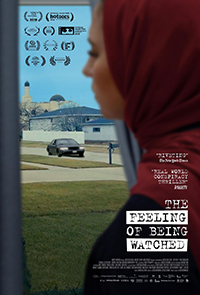 We now know that the FBI launched Operation Vulgar Betrayal in the 1990s to investigate Muslim American residents of Bridgeview, Illinois, based on what seems to be little more than ethnic and religious profiling. Assia Boundaoui was a child in Bridgeview then, the daughter of Algerian parents, and her film tracks her own scrutiny of the FBI's intense surveillance of her hometown. She explains how such surveillance inculcates paranoia into an entire community and results in fear and willing subjugation of self. When she applies for information from the FBI under FOIA, she is denied. She wins a court case to have the documents of the operation released, and they reveal a sprawling, intense examination. It bears mentioning that no terrorism-related charges were ever filed against anyone involved. This film is a riveting examination of the outcome of the FBI's actions and Boundaoui's persistence in revealing the truth. We don’t know, though — is the government still watching?
We now know that the FBI launched Operation Vulgar Betrayal in the 1990s to investigate Muslim American residents of Bridgeview, Illinois, based on what seems to be little more than ethnic and religious profiling. Assia Boundaoui was a child in Bridgeview then, the daughter of Algerian parents, and her film tracks her own scrutiny of the FBI's intense surveillance of her hometown. She explains how such surveillance inculcates paranoia into an entire community and results in fear and willing subjugation of self. When she applies for information from the FBI under FOIA, she is denied. She wins a court case to have the documents of the operation released, and they reveal a sprawling, intense examination. It bears mentioning that no terrorism-related charges were ever filed against anyone involved. This film is a riveting examination of the outcome of the FBI's actions and Boundaoui's persistence in revealing the truth. We don’t know, though — is the government still watching?
